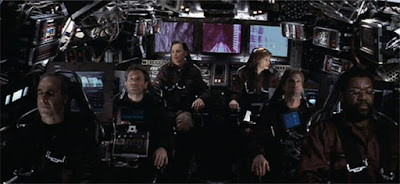But, I also can't argue that it's a lot of fun to watch, even if the movie fails on almost every technical accomplishment, including special effects.
Oh, that Mother Earth. She really is a Mother. Odd things are happening around the globe. The Northern Lights are heading South. Birds are starting to fly erratically in disorganized flocks and fly into buildings, buses and people. Worst of all, the space shuttle, the biggest bird of all, fires its retro-rockets to return to Earth, but, rather falling to its landing strip in Florida, it ends up off the coast of California, necessitating a landing in the sluices of the Los Angeles River, prompting an investigation of its Commander, Richard Iverson (Bruce Greenwood) and, most especially, its navigator and co-pilot Astronaut Major Rebecca "Beck" Childs (Hillary Swank).
On a less global scale, geophysicist Dr. Joshua "Josh" Keyes (Aaron Eckhart), a professor at the University of Chicago, is pulled out of class by Feds "Indiana" Jones-style, and asked for his expertise on what's going on in the world. His investigations startle him, and he brings in pal Serge Leveque (Tcheky Karyo) and prickly scientific populist Conrad Zinsky (Stanley Tucci) to confirm his findings—the Earth's magnetic field is out of whack and disappearing due to the lack of rotation in the Earth's liquid outer core. If that stuff doesn't start moving pretty quickly, then all electronics on Earth will be disabled throwing us back into the stone-age, and then the Earth will be bombarded by the Sun's micro-waves and solar wind, throwing us into the charcoal age.
Scientifically speaking, this is "bad news." Although, if you can reach into your video screen of this movie and turn on its news-channels, I'm sure you'd find all sorts of "charcoal-age" deniers willing to foam at the mouth on-camera for AFTRA minimum, making as much sense as those saying that the Earth can't have a core because it's flat. Maybe if we threw them down into the liquid core, we'd get enough "spin" to re-start the magnetic field. But, I digress...
That "talking-head-hot-air" option is not explored. Instead, the suggestion is that if somebody can drill down to the molten core and drop nuclear war-heads of sufficient magnitude, it just might work. After all, if you could launch shuttles to blow up asteroids, or shrink scientists and inject them into blood-streams to laser blood-clots, why not? Trouble is, it's hot down there—9,000°F hot—enough to melt steel or any other construct to make nuclear weapons, and there's enough pressure to crush anything down to pancake-width, so what to do?
When you have an impossible task, call an engineer. Fortunately, among the people Pinsky has pissed off in his career is a brilliant one, Dr. Edward "Brazz" Brazzleton (Delroy Lindo—always welcome). He's been living in the desert making very handy, impossible things that no one has heard about. For one thing, he's invented a laser "impeller" system that can liquefy anything in its path...except for the other thing he's invented—a substance called "unobtainium, "* which is a miracle metal that can stand up to incredible heat and crushing pressure—just the sort of thing you'd need to to build a ship to dig to the center of the Earth.** That seems awfully convenient to keep the movie going. But, then, the movie is powered by "suspendbelievium."
 |
| Brazzleton's inventions pitted against each other. |
Once they have the impossible boring capacity and the material to build a ship that can't be cooked or crushed (and uses those things to supply power—even more convenient), they spend an incredible amount of money to build the good ship "Teflon" (dubbed "Virgil" after the author of "The Aeneid") to carry a crew of specialists to launch the nukes and then get out of town fast enough to get obliterated. Good luck with that. With such a suicide mission, you would think they would come up with a competent but disposable crew to carry it out. But guess who they choose—the very essential designers and theoreticians who came up with the crazy scheme in the first place. Okey-dokey. They only have one chance to do it and not get fried because nobody on Earth would be able to duplicate it.
Everything about this movie makes no sense, whatsoever. But, if something isn't sensible, it's at least Hollywood.
Later we will find out that the whole trip was, essentially, not necessary, and that the phenomenon that's affecting the Earth is not completely the natural disaster that it's presented to be—due to meddling humans, again, who can't leave well enough alone, and if they can't "monetize" something, they'll "weaponize" it. But, forget all that "unobtainium ad absurdium." The best part of the movie is the interplay between the characters once they get on board the good ship "Teflon," and, fortunately, you've got some truly gifted character actors on board, all who know how to fill time quickly and fill holes in the script (some of which are cavernous), even while they're boring holes in the crust, and method-acting staring at green-screens that actually show them nothing.
Sure. It's dumb. Sure, it's unscientific. Sure, it's unbelievable. But, the actors make it work, to the point where they could be fighting flaming Jell-o (sometimes the special effects look like that) and it would still be fun and still be inexplicably watchable. The story, the FX, are merely the crust. It's the actors that make up the solid core of the movie.
* Yeah, yeah, all you Avatar apologists out there—it's the same thing they're after in Avatar. But, The Core preceded Avatar by 6 years.** When asked how soon he could get a vessel up and running with his inventions, Brazzleton cackles: "Three months?" Fifty billion dollars!" The general in charge of the project (Richard Jenkins, also welcome) deadpans "Will you take a check?" Keyes looks over: "Use a credit card. You'll get miles."









No comments:
Post a Comment